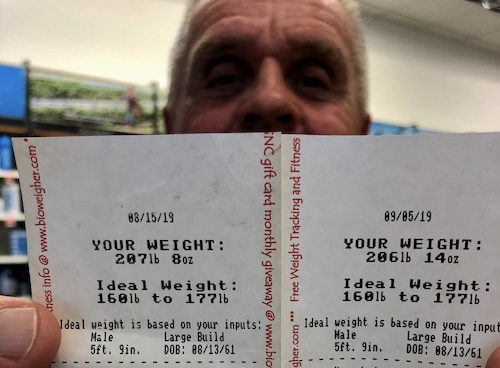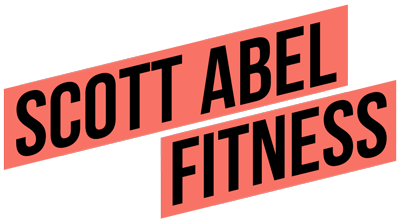How does someone deliberately and consciously overeat for 17 days and not gain any weight?
In my article last week, I discussed the results of 17 days of over-feeding:

Before Weight: 207 lb 8 oz
Return Weight: 206 lb 14 oz
(three days after 17 days of overeating)
In terms of what I’ve been saying about metabolism, this whole experiment was me putting my money where my mouth is.
The details of how to put your body into a state of supercompensation mode in order to benefit from periodic (or “cyclic”) cheat days and overfeeding are in my Cycle Diet book and of course in my Cycle Diet online course. This helps you optimize your metabolism over the long-term, cumulative realm of time. (Think of it as the opposite of damaging your metabolism over time by doing extreme yo-yo diets again and again.)
The experiment showed the long-term metabolic benefits of the Cycle Diet. With an optimized metabolism it is actually very hard to gain unwanted fat weight from diet indiscretions or from indulging in well-planned and well-timed cheat days or refeeds.
To reiterate the main point from my last article: there is no magic to this stuff; there is just focusing on that long-term, cumulative realm of time.
However, aside from this idea (which sounds fine in theory), what does that look like in the real world?
That’s what this article is about. I’ll discuss 3 key factors that I believe contribute to an optimized metabolism.
Key #1. Eat a Carbs-Based Diet
One of the “secrets” (that isn’t really a secret) to optimizing metabolism is the carbs-based diet. All of the leanest, healthiest, longest-living cultures on the planet have traditionally consumed a carbs-based diet.
I have argued for a carbs-based diet my whole career. I know that a healthy amount of carbs have a lot to do with optimizing my own metabolism, and it has a lot to do with the success of my coaching clients. My coaching clients always eat carbs!
Conversely, I can tell you that the worst cases of rebound permanent weight-gain from diets almost always seem to come from cutting carbs and starches too much and for too long. Lots of studies show that when people rebound from ill-advised diets, they not only gain all the weight back, but a higher percentage of that weight is fat. Low-carb diets interfere with your body’s natural hunger, digestion and metabolic processes. Avoid them.
Furthermore, what got me on to doing this overfeeding experiment was when Dr. Greger mentioned and reminded me of ‘overfeeding studies’ in my podcast discussion with him:
One such overfeeding experiment showed that it takes 100,000 more calories from carbs to gain the same amount of fat weight overfeeding as it does from fat.
What about insulin resistance?
As I have argued many times, the argument that carbs leads to insulin resistance which leads to fat gain has been debunked over and over again.
Dr. Greger recently released a video discussing the evidence that a keto diet can actually make carbohydrate intolerance worse.
Key #2. Eat a Whole Foods, Plant-Based Diet
If you really want to optimize your metabolism for health then adapting a whole food, plant-based diet makes the most sense. I have no doubt that switching to a plant-based diet optimized my metabolism relative to when I was eating meat.
To be clear, I’d previously done just fine on an omnivore diet. Also, plant-based vs. omnivore is not something I ever impose on clients — it’s their decision. However, if I’m honest, then yes, giving up animal food sources has taken my metabolism to another level.
In terms of why, I believe the changes in gut microbiome make digestion more natural and efficient; and this seems to have a pronounced and promotive effect on overall metabolism.
For instance, during the experiment many people asked about my digestion: Do you have cramps eating like this? What about bloating or distention? Many people made comments like, “I could never eat like that, my stomach would be way bloated out!”
And yet, I generally didn’t experience this. My metabolism just felt ready for what I fed it. The only time I even felt uncomfortably “full” was the day I ate the pistachio cake and the carrot cake together:

Both of these likely had dairy and eggs in them. I found these made me feel a bit more full, but I will say it didn’t last very long. I never got bloated, distended or crampy – just much more full than usual, relative to the other 17 days.
My point: I have no doubt that adapting a whole foods, plant-based diet improves metabolism even further, mostly via improved digestive health.
Again, no magic tricks here. Just solid big-picture keys.
Key #3. Enjoy Situational Hyper-metabolism
On the short-term basis I also had situational hyper-metabolism so that I was burning far more calories than usual.
The first and most obvious reason for this would be simply from the increase in calories. If optimized, your metabolism goes into hyperdrive to compensate. This is often what happens to clients when they have a cheat day: they feel hot and sweaty and full of energy. That’s hyper-metabolism coming in to compensate. Although it impressed even me, the fact that the effect lasted for 17 days is just a result of the long-term optimization thing I’ve been discussing.
However, it wasn’t just the calories.
Adding to the situational hyper-metabolism effect was the fact that I was in a hot, humid and sunny climate to which my body had to very suddenly adjust. Such an adjustment is always metabolically expensive.
I’ll note that it’s too bad most people never consider this. Year after year on vacations I see people in hotel gyms walking on treadmills when they could be outside walking the beautiful sandy beaches and getting a far better metabolic payoff from doing so! All I do in Aruba is walk the beach, and it always pays off metabolically because of situational hyper-metabolism.
This has an added effect because I’m not worrying or feeling guilt about my vacation, and that, too, is important. The stress of guilt — both the stress hormones and the behaviors that often follow — are bad for metabolism. Enjoying a cheat day or overfeed is good for metabolism. Something like the Cycle Diet won't work if you are feeling guilt the whole time.
This is more important than people realize, and I’ll be discussing it in a future article!
Conclusion
To be sure, eating for 17 days straight isn’t something I’d recommend. That’s NOT the point of the experiment or these articles.
But I’m not just one of those lucky people who won the metabolic lottery. It’s not magic, genetics, or luck.
It’s long-term optimization through several of the key factors I’ve discussed here. Indeed, the elements of diet-psychology that are related to this experiment deserve their own article, and I’ll be releasing it shortly.

